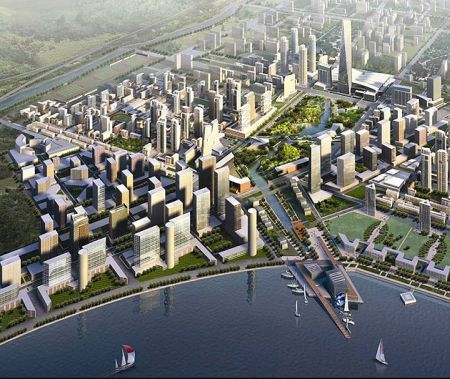Smart cities are really about clustering smart people and institutions, explains Sanjeev Sanyal.
 Around the world, there is a lot of discussion these days about smart cities. The Indian government, too, has been talking about building a hundred smart cities. But what are "smart cities"?
Around the world, there is a lot of discussion these days about smart cities. The Indian government, too, has been talking about building a hundred smart cities. But what are "smart cities"?
If one probes a little, one quickly discovers that it is essentially about embedding the latest digital technologies - from sensors and Big Data to solar panels - in the masterplan in order to optimise urban clusters.
Smart city enthusiasts advocate that countries like India, that need to build new cities, should use the opportunity to hardwire the latest technology in the design.
While new technologies should certainly be deployed, should we define "smartness" purely in terms of the latest technology?
Smart cities are not like smartphones that one can replace them when the next model become available.
Cities last centuries and success depends on the ability to constantly adapt to new economic, social and technological contexts.
Is there not a danger that we undermine long-term flexibility by single-minded pursuit of static optimisation?
In order to understand the dynamics of cities, one must first recognise that they are "complex adaptive systems" just like natural ecosystems, macro-economic systems, weather systems and so on.
This means that outcomes evolve from the complex interaction of constantly mutating elements. When managing such systems, one must first accept that there is no optimal "equilibrium" that one should aspire for.
This is why socialist economic planning and traditional urban master-planning are bound to fail. They are based on a fundamental misconception about the state of the world.
This does not mean that one cannot improve outcomes through active management. Far from it, successful economies, wildlife reserves and urban centres are actively management.
However, the managers focus on very different things. One example is clear property rights. As detailed in my past writings on Delhi's "lal-dora" villages, even slums can evolve and upgrade themselves when property rights are clear. In contrast, squatter slums only change through external intervention.
Surely then, the design of the intricate network of property rights, including that of the ownership and access to public spaces and infrastructure, should be a key element of "smartness". Sadly, it is not even a part of the debate.
Similarly, a key element that defines great urban hubs is the way people move around and interact. Everyone agrees that a public transport system is very important in this context, but the backbone of any such infrastructure is walking.
After all, the first and last mile must be walked. Walking may be the most basic technology but it is critical to smartness. Yet, it is not an important part of the smart city discussion.
It should be recognised, furthermore, that smart cities are ultimately about clustering smart people and not steel-and-chrome towers. Building human capital clusters also requires active management and investment.
One obvious strategy is to weave educational, cultural and intellectual institutions into the fabric of the city. Yet, Indian urban planners are doing exactly the opposite. Universities are not being built as part of the city but as large stand-alone islands outside the city.
This is not just a waste of land and amenities, but also gets in the way of creating clusters. Similarly, the smart city advocates say little about the need to make space for museums, think tanks, theatres, temples, sports facilities or iconic buildings.
No amount of digital technology can create a human capital cluster without investing in such cultural and intellectual institutions.
Even if all the above elements are taken into account, long-term success depends ultimately on flexibility. There are currently several attempts to build smart cities from scratch. Perhaps the most ambitious is MasdarCity being built at great expense near Abu Dhabi.
The city's designers have taken care, in theory at least, to include walkability and social interaction in the planning. However, the real focus of the experiment is to hardwire the latest digital technology into the urban landscape.
My concern is that even if the project is finished and then populated, the city could become outdated within a decade of going live.
A complex adaptive system evolves by constantly adjusting to random, unpredictable mutations. A fully integrated and internally consistent system will have great difficulty dealing with this organic phenomenon.
Let me clarify that I am not a Luddite who is against deploying new technology. I am merely arguing that technology is a useful tool for achieving other objectives and is not a goal in itself.
For instance, property rights can greatly benefit from digital records and mapping. Walking systems can similarly be optimised using video mapping and Big Data to analyse how people move around a city.
Singapore, perhaps the closest we have to an existing smart city, uses an elaborate system of electric road pricing to manage traffic congestion.
However, note that it simultaneously invests in building and populating new theatres, museums, universities and stadiums.
In recent years, I have been personally involved in an effort to map and create new cycling and pedestrian paths in the city.
Great care is taken to ensure that these institutions and infrastructure are not islands of excellence but feed into the overall urban fabric.
In short, the government's smart city project must not get hijacked by technological derring-do. Smart cities are really about bringing together smart human capital and institutions.
The author is managing director & global strategist of one of the world's largest banks. He is also an internationally recognised urban theorist.











